New Year in Japan has many traditions, from the food to household decorations. Television is part of the ritual of Oshogatsu, perhaps most famously the NHK music show Kohaku. Another perennial favorite is the New Year’s Eve special of long-running comedy show Downtown no Gaki no Tsukai ya Arahende!!, or just Gaki no Tsukai, which has been broadcast annually on December 31st for several years. Its premise is that the comedy duo Downtown and other guests are forced to do increasingly ridiculous things in an outlandish setting. In what is known as the No-Laughing Batsu Game, every time one of the comedians laughs is rewarded with a physical punishment.
It is a genuinely funny show, full of in-jokes and slapstick, and attracts a huge audience as counter-programming to the music on NHK. For this year’s edition, however, one of those “ridiculous” things was pretending to be black.
It is a typical aspect of the show that the main comedians have to wear silly clothes or alter their appearance in other ways. As part of his ordeal, the comedian Masatoshi Hamada had to endure being transformed into Eddie Murphy. Culturally sensitive viewers were dismayed to see Hamada in blackface from the first few minutes of the show that lasts several hours.
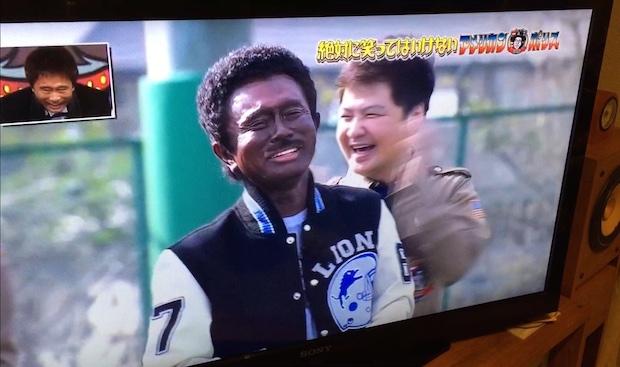
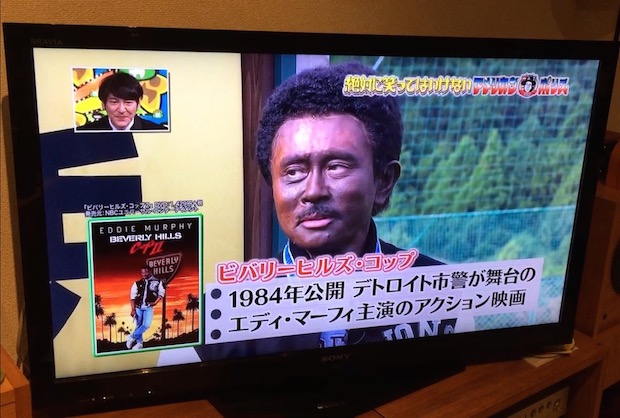
The black, Yokohama-based journalist Baye McNeil was one of the first to call this out as racist and inappropriate, leading a charge on Twitter to complain to the broadcaster, NTV.
Unfortunately, blackface in Japan is nothing new and examples of it crop up in comedy, music and entertainment.
A December 2017 production in Tokyo of the musical Memphis also featured an almost entire cast of Japanese performers in blackface alongside Pittsburgh-born, black singer Jero.
Other recent cases of high-profile racism or perceived inappropriate choices in popular culture in Japan include a woefully misjudged advertising campaign by ANA with Japanese performers wearing fake noses to play “foreign” characters. That was back in 2014, but came only shortly after a similar campaign by Toshiba.
In 2015, the idol group Momoiro Clover Z posed in blackface with Rats & Star, a much older music group that has longer performed in blackface. When a photograph of the two groups posing in blackface went viral, the TV channel sensibly backed down and did not broadcast the segment.

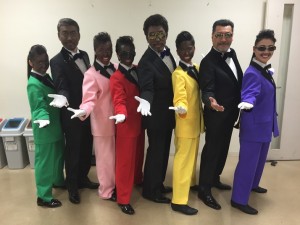
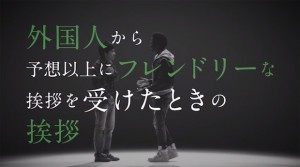
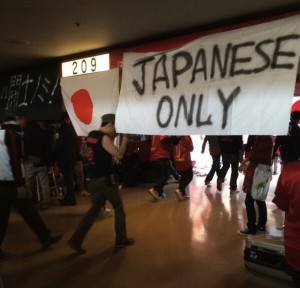





















5 Comments
It appears he is actually a specific movie character, Axel Foley from Beverly Hills cop. Same jacket, same little mustache.
And if he wasn’t colored black it would have been an insult to black actors/actresses by not acknowledging their race or some other bullshit, what a trash article.
dude the japanese mean no harm like its cool dude. like i understand all shows arent for eveyone but not everything someones always gonna see something wrong in something. like this show didnt specifically make this episode to be racist and hurt anyones feelings cuz i dont think thats what theyre about. like someones job was to decide to dress this guy up as black guy but maye he thought about it twice after he submitted it man. he thought “well how am i supposed to make peoplethinkits a black dude.” actually maybe they used it for a shockfactor idk honestly there arent that many black people in japan so not alot of people in the country side parts every see some than TV maybe. but i feel what you mean i thought about it and said to myself what if “someone were to describe my race” didnt like the stereotypical answer in my head lol because im 2/3 of them physically. but its just a comedy show man take a joke.
What do blacks say about this? Japanese people themselves are colored and discriminated side . A few years ago, performance of kimono was accused as racial discrimination in Boston museum. However, authentic Japanese said nothing. Japan proposed anti-racism agreement to Int’l Federation before WW2 but it was rejected by whites’ countries. Popular jazz musicians said he had been liberated from racism in Japan.
it isn’t racist at all. it isn’t being derogatory or discriminatory. when they go in blackface like the photos above it’s simply cosplay.
baring in mind the ethnic breakdown, there are very few black people in japan.
if it’s a group that plays music in a style typically associated with black culture they’ll cosply in black face. portraying a black character, do it in blackface.
it far more towards respect of the source than it is mockery of it.
they don’t have the same history as the US when it comes to slavery and race relations so they don’t do it with the same motivations. the reporter you mentioned actually needs to clue himself up on japans history and their cultural values if he’s going to be reporting on things like this.
looking at it with western political correctness goggles on is only going to give you the wrong impression.